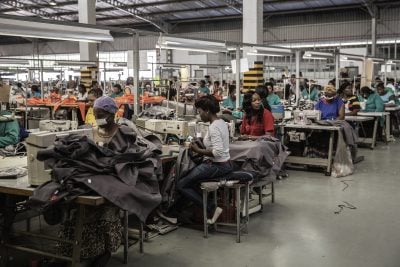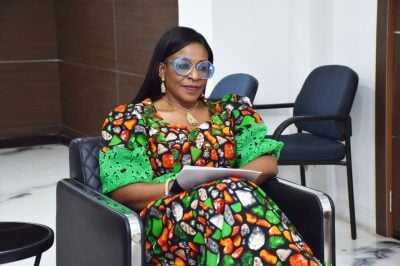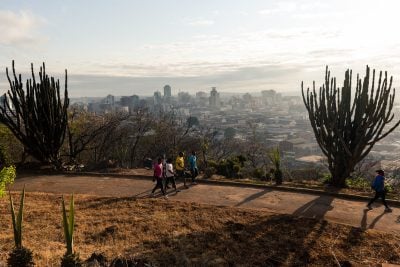In common with other members of the new wave of African investment, Brasilia is utilising soft power to increase its influence in Africa. Beijing has made great use of this strategy, using ‘power plant diplomacy’ in order to secure access to raw materials in exchange for the construction of power plants and other much needed infrastructure. Brazil is now using a combination of diplomatic cooperation and financial support to build relations with African governments but with a far smaller budget than China, its approach must be closely targeted.
Brazil has only recently emerged as a donor country in its own right and still receives development funding itself. Brasilia now offers a range of technical cooperation and scholarships to study at Brazilian institutions. Lusophone countries benefit most because it is easier for fellow Portuguese speakers to study at Brazilian institutions.
Brazilian ministers, diplomats and development agencies are all keen to point out that the country’s development strategy aims to be different to that of other countries. It is designed to be a partnership of mutual benefit and ‘peer learning’ rather than the granting of aid from one country to another.
In this sense, the government of Brazil is following the tradition of the South-South movement that emerged in the 1960s, when developing countries sought to build relations between themselves in order to reduce their dependency on the industrialised world. Lula was particularly keen to promote this concept. He said: “A new global political and economic geography will only be possible if actors with similar interests chose direct dialogue and joint action in international fora”.
The national development organisation, Agência Brasileira de Cooperação (ABC), aims to use Brazilian experience to help solve African problems. The organisation states that it bases its support on knowledge transfer, capacity building, the use of local labour, project design based on local specificities, an absence of conditionality and respect for sovereignty. It operates in 81 countries around the world, of which 36 are in Africa. The biggest recipient of its support is Mozambique.
ABC promotes the idea that it understands recipient needs because it was itself previously a major recipient of development support. ABC, which has the slogan: “for each African problem, there is a Brazilian solution”, had its annual budget tripled between 2005 and 2009 and increased by $300m in its latest budget review, almost all of which will be used in Africa. ABC’s cooperation focuses mainly on five areas:
• skills development, in partnership with SENAI, the national service for industrial learning;
• education, including the use of successful domestic programmes such as bolsa escola or alfabetização solidária;
• public health, in partnership with the ministry of health and Fundação Oswaldo Cruz; prevention and control of HIV, malaria and other tropical diseases. Plus technological transfer and medication production;
• agriculture, in association with the Brazilian Enterprise for Agricultural Research (EMBRAPA), focusing on biofuels projects and tropical agriculture);
• social development, including fostering the state’s role in promoting social development and fighting inequalities by adapting Brazilian successful programmes such as bolsa familia and fome zero.
Brazil cancels debt
It will be interesting to assess how long Brasilia maintains its enthusiasm for the African continent, following the end of the Lula government. Although Lula’s successor, Dilma Rousseff, has not visited Africa with such regularity, she visited both Angola and Mozambique during her first year in office and has been sure to emphasise technology transfer and the employment of Africans on Brazilian projects in her speeches.
Rousseff has also introduced some interesting initiatives. In late September, Itamaraty announced that it would cancel almost $900m in debt owed by 12 African governments, headed by Congo-Brazzaville, with $350m, and Tanzania with $237m. The others are Côte d’Ivoire, Democratic Republic of Congo, Gabon, Guinea, Guinea-Bissau, Mauritania, São Tomé and Príncipe, Senegal, Sudan and Zambia.
An Itamaraty spokesperson said that the plan was part of the wider debt forgiveness offered by the Paris Club of creditor countries and “an international practice with clear objectives to keep the debt burden from being an impediment to economic growth and anti-poverty efforts”.
Echoing Lula’s sentiments, Rousseff said that the deal was “a two-way street that benefits both the African countries and Brazil”. This debt cancellation could also be designed to enable new loans to be granted to African governments to fund projects to be undertaken by Brazilian companies, although opposition politicians have condemned the cancellation of debt held by undemocratic governments on the list.
There is some evidence to suggest that Brazilian experience is of particular use in Africa because of the similarity in colonial history, racial problems, climate and poverty.
Above all else, Brazil is pioneering a new model of trilateral support. Governments, including the US and Japan, and non-governmental organisations, such as the Bill & Melinda Gates Foundation, have provided funding for projects provided by Brazilian institutions, thereby taking advantage of the latter’s expertise in a particularly area.
However, there are some weaknesses in Brazilian development support in Africa. Ana Cristina Alves of the South African Institute of International Affairs (SAIIA) lists five particular problems:
First, the massive expansion of cooperation projects in a short period of time has not only created severe capacity overstretch of human and financial resource, but also considerable institutional fragmentation, poor central planning and coordination among all agents involved, such as ABC, BNDES and various ministries.
This produces overlaps and prevents synergies, undermines evaluation of costs and benefits and leads to ad hoc projects that present serious long-term planning challenges.
Second, Brazil still lacks a Cooperation Law necessary to clarify the authority line, legitimise the use of public funds and regulate the funding of cooperation project.
This is the main reason why Brazil’s cooperation still lacks a financial component, which has proven extremely impairing. Cooperation legislation has been drafted but not yet passed.
Third, Brazil needs to address the increasing pressure to include civil society in this process, in order to make it more democratic and transparent as these funds originate from tax payers in a country that still faces a lot of economic and social challenges.
Fourth, the flow of information can be just in one direction and this represents a direct threat to Brazil’s credentials as a South-South partner in the future.
Last, the institutional structure lacks a monitoring and evaluation mechanism to assess the impact of its cooperation. This is critical for correcting inefficiencies, avoiding waste of resources and ensuring the expected results, and key for gaining full domestic legitimacy as well as credibility abroad.
Want to continue reading? Subscribe today.
You've read all your free articles for this month! Subscribe now to enjoy full access to our content.
Digital Monthly
£8.00 / month
Receive full unlimited access to our articles, opinions, podcasts and more.
Digital Yearly
£70.00 / year
Our best value offer - save £26 and gain access to all of our digital content for an entire year!
 Sign in with Google
Sign in with Google 


